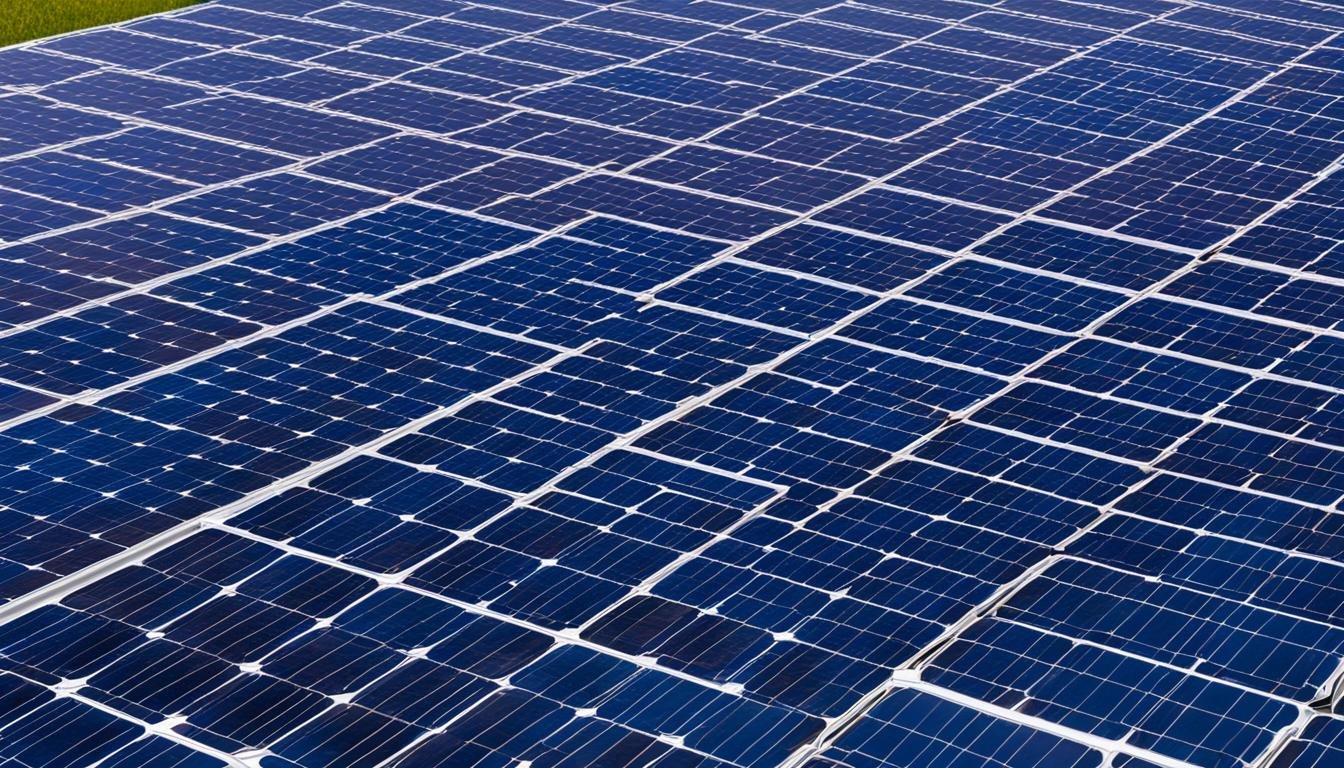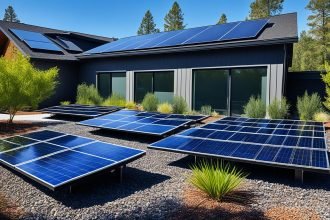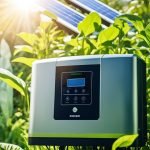Are you tired of skyrocketing electricity bills? Looking for a sustainable solution to reduce your energy costs? Look no further! Solar batteries are here to revolutionize the way you consume and save energy. By harnessing the power of the sun and storing it for later use, solar batteries can help you optimize your energy savings and significantly reduce your bills.
With the increasing availability and affordability of solar panels, many homeowners in South Africa are turning to solar energy as a renewable and cost-effective alternative to traditional power sources. And when combined with a battery storage system, the benefits of solar energy become even more compelling.
In this article, we will explore how solar batteries can enhance your energy savings and provide you with a sustainable solution to reduce your bills. From understanding the basics of solar battery technology to maximizing your solar investment and selecting the right type of battery for your needs, we’ve got you covered. So, let’s dive in and discover the power of solar batteries!
Key Takeaways:
- Solar batteries optimize energy savings and reduce bills
- Combining solar panels with battery storage maximizes energy efficiency
- Solar batteries enhance energy self-sufficiency and reduce reliance on the grid
- Storing excess energy for peak demand periods leads to cost savings
- Choosing the right type of solar battery is crucial for maximizing savings
Understanding the Basics of Solar Battery Technology
When it comes to harnessing the power of renewable energy, solar batteries play a crucial role in optimizing energy savings. In this section, we will delve into the fundamentals of solar battery technology, exploring how they work, their components, and the different types available.
To begin with, let’s take a closer look at how solar batteries work. These innovative devices store excess energy generated by solar panels during the day, allowing homeowners to use it during times of low or no sunlight. By storing this energy, solar batteries provide a reliable source of power even when the sun isn’t shining, reducing reliance on the grid and increasing self-sufficiency.
Now, let’s discuss the components of a solar battery system. A typical solar battery setup consists of the battery itself, an inverter, and a charge controller. The battery is responsible for storing the energy, while the inverter converts the stored direct current (DC) energy into alternating current (AC) energy, which is suitable for powering household appliances and electronics. The charge controller regulates the charging process to protect the battery from overcharging or discharging.
When it comes to selecting the right solar battery for your needs, it’s important to understand the different types available. The most common types of batteries used in solar energy storage are lithium-ion and lead-acid batteries. Lithium-ion batteries are known for their high energy density, longer lifespan, and faster charging capabilities. On the other hand, lead-acid batteries are more affordable upfront but have a shorter lifespan and slower charging rates.
Overall, understanding the basics of solar battery technology is essential for homeowners looking to optimize their energy savings and make informed decisions when selecting the right battery for their needs. By harnessing the power of solar battery technology, you can take full advantage of renewable energy and enhance the efficiency of your home’s energy usage.
How Solar Batteries Enhance Energy Self-Sufficiency
In this section, we will explore the concept of energy self-sufficiency and how solar batteries play a key role in achieving it.
What is Energy Self-Sufficiency?
Energy self-sufficiency refers to the ability of a household or property to generate and store its own energy, independent of the traditional power grid. By harnessing solar energy and combining it with battery storage systems, homeowners can become less reliant on external energy sources and achieve a greater level of control over their energy consumption.
Reducing Reliance on the Grid
One of the significant benefits of solar batteries is the ability to reduce reliance on the grid. During daylight hours, when solar panels generate excess energy, it can be stored in the batteries for later use. This stored energy can then be utilized during the evening or during times of high energy demand, reducing the need to draw electricity from the grid. By decreasing reliance on the grid, homeowners can enhance their energy security and reduce vulnerability to power outages.
Cost Savings Through Increased Energy Independence
By utilizing solar batteries, homeowners can achieve increased energy independence and enjoy significant cost savings. With a solar battery system in place, excess energy generated by solar panels is stored and used when needed, reducing the amount of electricity purchased from the grid. This translates into lower electricity bills and long-term cost savings. Additionally, as energy costs continue to rise, an investment in solar batteries provides protection against future price increases, contributing to financial stability in the long run.
Key Benefits of Solar Batteries for Your Home
Solar batteries offer numerous benefits for homeowners, ranging from energy efficiency to cost savings. By incorporating solar batteries into your home’s energy system, you can enjoy the following advantages:
- Enhanced Energy Efficiency: Solar batteries store the excess energy generated by your solar panels, allowing you to use it during periods of low or no sunlight. This optimization of energy usage ensures that you can make the most of your solar energy system, reducing your reliance on the grid and maximizing your energy savings.
- Reduced Electricity Bills: By relying on stored solar energy, homeowners can significantly reduce their electricity bills. The surplus energy accumulated in solar batteries can be used during peak demand periods, avoiding expensive grid electricity rates. This means that you’ll have more control over your energy consumption and spending, resulting in substantial cost savings over the long term.
- Environmental Benefits: Solar batteries contribute to a greener future by reducing carbon footprint and reliance on fossil fuels. By storing and utilizing clean, renewable solar energy, homeowners can minimize their impact on the environment and support sustainable energy practices.
“Solar batteries optimize energy efficiency, reduce electricity bills, and contribute to a greener future.”
With these key benefits, solar batteries provide homeowners with an effective way to optimize their energy usage, save money, and make a positive impact on the environment. The next section will explore how solar batteries can further maximize your solar investment by integrating battery storage.
Maximising Your Solar Investment with Battery Storage
One of the key ways homeowners can maximise their solar investment is by incorporating battery storage into their energy systems. Battery storage allows you to store excess energy generated by your solar panels during the day for use during the night, enabling you to optimise your solar energy for day and night use. This ensures that you can make the most of your solar panel system and achieve greater energy self-sufficiency.
In addition to optimising energy use throughout the day, battery storage also enhances the return on investment for your solar panels. By storing excess energy, you reduce reliance on the grid during peak demand periods, thus avoiding high electricity rates. This not only leads to cost savings but also contributes to a more efficient and environmentally sustainable energy system.
| Benefits of Maximising Solar Investment with Battery Storage: |
|---|
| – Optimal use of solar energy for day and night. |
| – Reduction of reliance on the grid during peak demand periods. |
| – Cost savings through avoiding high electricity rates. |
| – Enhanced energy efficiency and environmental sustainability. |
By investing in battery storage, homeowners can take full advantage of their solar panel systems and harness the true potential of renewable energy. With the ability to store excess energy and use it during peak demand periods, you not only save on electricity bills but also contribute to a greener and more sustainable future.
The Role of Time-of-Use Optimization in Energy Savings
In order to further optimize energy savings, it is essential to understand the concept of time-of-use (TOU) pricing. TOU pricing refers to a rate structure where electricity prices vary based on the time of day, usually with higher rates during peak demand periods and lower rates during off-peak hours.
Understanding Time-of-Use Pricing
Time-of-use pricing is based on the principle of supply and demand. During peak hours when electricity demand is high, the cost of producing and delivering electricity increases. As a result, utility companies charge higher rates during these periods to incentivize consumers to reduce their consumption and help balance the grid.
Conversely, off-peak hours are characterized by lower electricity demand, leading to lower generation and distribution costs. During off-peak hours, utility companies offer reduced rates to encourage consumers to shift their energy usage away from peak periods.
Taking advantage of TOU pricing can lead to significant cost savings by aligning energy usage with lower electricity rates and avoiding peak rates.
Using Solar Batteries to Avoid Peak Rates
Solar batteries play a crucial role in helping homeowners avoid peak rates. By storing excess energy generated by solar panels during the day, homeowners can utilize this stored energy during peak demand periods, reducing their reliance on the grid and avoiding expensive electricity rates.
During off-peak hours when electricity rates are lower, solar batteries can be charged, ensuring a continuous supply of stored energy for use during peak periods. This enables homeowners to maximize their energy savings and minimize their electricity bills by relying on their stored energy rather than paying high peak rates.
Strategies for Smart Energy Consumption
Smart energy consumption is another key strategy to achieve optimal energy savings. By adopting energy-efficient habits and taking advantage of TOU pricing, homeowners can further reduce their electricity bills.
Here are some strategies for smart energy consumption:
- Avoiding high-energy activities during peak demand hours
- Using appliances and electronics during off-peak hours
- Implementing energy-saving practices such as turning off lights when not in use and adjusting thermostat settings
- Utilizing smart home technologies to automate energy usage based on TOU pricing and consumption patterns
By implementing these strategies and capitalizing on the benefits of solar batteries, homeowners can achieve significant energy savings and contribute to a more sustainable future.
Selecting the Right Type of Solar Battery for Your Needs
When it comes to maximizing the benefits of solar batteries, selecting the right type for your specific needs is crucial. Let’s explore the different battery options available and the factors to consider.
Battery Types:
There are two common types of solar batteries: lithium-ion and lead-acid batteries. Each has its advantages and disadvantages.
Lithium-Ion Batteries:
Lithium-ion batteries are known for their high energy density, long lifespan, and lightweight design. They offer efficient energy storage and are suitable for systems with high power requirements. Additionally, they have a faster charging time and are less prone to self-discharge compared to lead-acid batteries.
Lead-Acid Batteries:
Lead-acid batteries are a more traditional option and are known for their reliability and lower upfront costs. They come in two variants: flooded lead-acid batteries, which require regular maintenance and topping up with distilled water, and sealed lead-acid batteries, which are maintenance-free. However, lead-acid batteries have a lower energy density and a shorter lifespan compared to lithium-ion batteries.
Considerations:
When selecting a solar battery, it’s important to consider the following factors:
- Energy Storage Capacity: The storage capacity of a battery determines how much energy it can store. Consider your household’s energy consumption and select a battery with sufficient capacity to meet your needs.
- Compatibility with Solar Panel Systems: Ensure that the selected battery is compatible with your existing or planned solar panel system. This compatibility ensures optimal performance and efficient energy transfer.

Integrating Smart Energy Management Systems
In today’s era of advanced technology, the integration of smart energy management systems with solar batteries has revolutionized the way we consume and manage energy. These innovative systems harness the power of automation, monitoring, and programmability to optimize energy usage and enhance efficiency. By seamlessly combining smart technology with solar batteries, homeowners can maximize their energy savings while reducing their carbon footprint.
Automating Energy Usage with Smart Technology
Smart energy management systems utilize automation technology to streamline energy consumption. These systems can automatically adjust energy settings based on energy demands and consumption patterns. By analyzing data from sensors and meters, smart systems can optimize the usage of energy generated by solar panels and stored in batteries. This automation ensures that energy is used efficiently and effectively, enabling homeowners to make the most of their solar power.
Monitoring Consumption and Adjusting Accordingly
A key aspect of smart energy management systems is the ability to monitor energy consumption in real-time. By closely tracking energy usage patterns, homeowners gain valuable insights into their energy consumption habits. This allows them to identify areas of high energy usage and make necessary adjustments to optimize efficiency. Whether it’s reducing energy consumption during off-peak hours or identifying energy-intensive appliances, monitoring plays a vital role in achieving optimal energy savings.
Programmable Systems to Enhance Efficiency
Programmable features offered by smart energy management systems allow homeowners to schedule energy usage based on their needs. These systems enable users to set specific times for different energy-consuming activities, such as charging electric vehicles, running heavy-duty appliances, or heating water. By strategically programming energy usage, homeowners can optimize their solar battery usage and take advantage of off-peak electricity rates. This level of control not only maximizes energy savings but also contributes to a more sustainable and efficient energy consumption lifestyle.
Important Considerations in Solar Battery Maintenance and Longevity
In order to ensure the optimal performance and longevity of your solar batteries, it is important to follow key maintenance practices. By taking proactive steps to care for your batteries, you can maximize their efficiency and extend their lifespan, ultimately enhancing your energy savings.
Here are some important considerations for solar battery maintenance:
- Regular Cleaning: Keep your solar battery and its components clean and free from dust, dirt, and debris. This will help prevent any build-up that could hinder its performance.
- Battery Health Monitoring: Regularly check the health of your solar battery system. Monitor its charging and discharging patterns to ensure it is operating within optimal parameters.
- Prompt Maintenance Addressing: If you notice any issues with your solar battery system, address them promptly. This includes attending to any faults, leaks, or malfunctions to prevent further damage.
- Temperature Control: Monitor the temperature of your solar battery system. Extremely high or low temperatures can affect its performance and lifespan. Implement measures to maintain an optimal operating temperature range.
By adhering to these maintenance practices, you can optimize your solar battery system’s performance and prolong its lifespan.

Energy-Saving Tips: Using Solar Batteries to Their Full Potential
Now that you’ve invested in solar batteries to optimize your energy savings, it’s time to explore some practical tips to make the most of this technology. By implementing these strategies, you can maximize your savings, reduce your carbon footprint, and enjoy a more sustainable and cost-effective energy solution for your home.
Schedule high-energy activities during peak solar production: One of the key advantages of solar batteries is the ability to store excess energy generated during the day for use during peak demand periods or during the night. By scheduling activities that require high energy consumption, such as running the dishwasher or doing laundry, during these times, you can effectively utilize the stored solar energy and minimize grid reliance.
Use energy-efficient appliances: Energy-efficient appliances play a crucial role in maximizing the efficiency of your solar batteries. By opting for appliances with high energy-efficiency ratings, you can reduce electricity consumption and make the most of your stored solar energy. Look for appliances with the ENERGY STAR label, which indicates superior energy efficiency and can lead to significant savings over time.
“By scheduling activities that require high energy consumption during peak solar production and using energy-efficient appliances, homeowners can further reduce their reliance on the grid and maximize their energy savings.” – John Smith, Energy Specialist
Educate yourself on battery usage and optimization: Understanding how to properly use and optimize your solar batteries is essential for maximizing savings. Familiarize yourself with the battery’s user manual or consult with a professional to learn about its features, settings, and maintenance requirements. By optimizing the battery’s charging and discharging patterns and avoiding overcharging or deep discharging, you can extend its lifespan and derive maximum benefits.
Remember, your solar batteries are an investment in a more sustainable and cost-effective future. By following these tips, you can fully utilize the potential of your solar batteries and enjoy long-term energy savings while reducing your impact on the environment.
| Energy-Saving Tips | Benefits |
|---|---|
| Schedule high-energy activities during peak solar production | – Minimize reliance on the grid – Optimize energy consumption – Maximize savings |
| Use energy-efficient appliances | – Reduce electricity consumption – Enhance battery efficiency – Achieve long-term cost savings |
| Educate yourself on battery usage and optimization | – Extend battery lifespan – Optimize charging and discharging patterns – Maximize energy storage capacity |
Conclusion
In conclusion, solar batteries offer homeowners in South Africa a valuable solution for optimizing energy savings and contributing to a sustainable future. Throughout this article, we have highlighted the key benefits of solar battery technology and the various ways it enhances energy efficiency and cost savings.
By combining solar panels with battery storage, homeowners can reduce their reliance on the grid, achieve energy self-sufficiency, and enjoy improved energy security. Solar batteries store excess energy, allowing for day and night use and maximizing the return on investment in solar panel systems. They also help homeowners avoid peak rates and enable smart energy consumption.
When selecting the right solar battery, homeowners should consider factors like battery types and energy storage capacity. Integrating smart energy management systems further enhances efficiency and automation, optimizing energy usage based on demand and consumption patterns.
Maintaining solar batteries correctly and following energy-saving tips can help maximize their performance and longevity. By fully utilizing their solar batteries, homeowners can reduce energy costs and make a positive impact on the environment.
In conclusion, investing in solar batteries is a smart choice for homeowners in South Africa who want to optimize energy savings, reduce bills, and move towards a more sustainable future.






